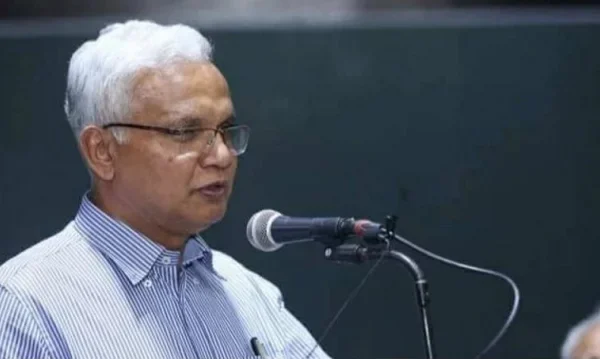Economic recession and government spending
- Update Time : Monday, August 18, 2025

—Abdul Bayes—
Just as the play ‘Hamlet’ is unimaginable without the Prince of Denmark, a discussion on the role of government spending during an economic depression is incomplete without John Maynard Keynes (1883-1946). I am not aware of any other economist besides Keynes who has had such a powerful influence on politicians through his policy advice.
According to the world-renowned philosopher Bertrand Russell, “Keynes was the most acute and clear intelligence I have known. When I argued with him, I felt that I was putting my life in my hands, and I often came out feeling a fool.”
When the world’s greatest minds were busy trying to find a way out of the Great Depression of the 1930s, the British Treasury (Ministry of Finance) recommended patience and reassured everyone that everything would be alright in the long run. Hearing this, Keynes became angry and said, “In the long run, we are all dead. So what needs to be done, must be done in the short run.” Keynes’s capsule formula came to be: increase government or private spending, and that is the miracle cure to be used against a depression.
The reason for this is easily understandable. An economic depression occurs when the total demand for goods and services is less than the total income. Keynes warned against the inadequate demand from households and businesses. If they do not buy enough, owners will lay off employees and reduce production. In Keynesian thought, the role of the government is very significant.
By reducing taxes or increasing spending, the government can directly save the sinking ship of the economy. This is Keynes’s capsule prescription against a depression. Keynes used to say that economists must be as practical as dentists; if a dentist were to poke the same tooth regardless of the patient, how many would continue to sit with their mouths open in the dentist’s reclining chair?
There is a slight difference between an economic depression and a recession. A depression is a state where everything is continuously and for a long time on a downward trend. That is, when there is a massive collapse in production, purchasing, employment, and so on.
On the other hand, a recession is a temporary slowdown in economic activity—a significant decrease in total output, income, and employment, especially for six months to a year, when a widespread contraction is observed across many sectors of the economy. A recession is a relatively milder form of economic downturn, although it shares several characteristics of a depression. There is a witty saying about this difference from the former and late U.S. President Ronald Reagan. In 1980, while campaigning against the then-President Jimmy Carter, he said, “A recession is when your neighbor loses his job. A depression is when you lose your job. A recovery is when Jimmy Carter loses his job.”
Although this is a repetition, Lord Maynard Keynes very succinctly captured the essence of a depression: Due to inadequate demand for goods and services from households and businesses, entrepreneurs lay off employees and reduce production. Since households buy more goods, their role in expanding overall demand is quite significant. How much a household spends depends on very important factors such as family size, taste, and expectations. However, income is the main driver of demand. If income increases, households will buy more; if income decreases, they will buy less. Keynes assumed that whenever someone receives an extra dollar or a rupee, they will spend most of that additional money and save the rest. Keynes called this the marginal propensity to consume. Not just consumers, but the business community also contributes to overall demand by investing in machinery and inventory. Investment primarily depends on a combination of expectations, interest rates, confidence, the overall climate, and politics. In short, to achieve a strong economy with full employment, households must spend enough on consumption, and at the same time, the business community must invest enough to sell their products so that the amount of sales equals production. Therefore, there are two fundamental components of Keynesian economic theory or Keynesian doctrine: (a) a private economy may not reach full employment, and (b) government spending can stimulate the economy to fill this gap.
One’s own spending is for oneself, but government spending is for everyone. There is an economy of spending, which is why government spending increases every year. Government spending plays a significant role in economic growth and development; for example, the construction and maintenance of roads facilitate the transport of goods; the supply of electricity through power plants makes it possible to carry out productive activities; and spending on education and health increases people’s productive capacity, thereby helping to build human capital. On the other hand, there is spending on national defense, law and order, civil administration, research and development, etc.—areas where the private sector does not often come forward for various reasons, so the government has to take on the responsibility of increasing spending. It should be noted that such spending generally does not lead to immediate production increases, but it contributes to GDP growth in the medium and long term and increases the marginal productivity of production factors.
If a person or a household spends their entire income, the value of the marginal propensity to consume will be 1. That is, an additional income of 1 unit of currency equals an additional expenditure of 1 unit. Let’s say “Friends and Friends Co.” spent $100 to build an extra room in its factory. The total expenditure increased by $100. On what? On the carpenter, the designer, and other supplies. The question is, what do the people who received the $100 do with it when they go home? They surely buy something and save the rest. The income of those who sell these goods increases, and they also spend their additional income on various things.
It is not difficult to understand that the higher the marginal propensity to consume, the higher the multiplier will be. And the higher the marginal propensity to save, the lower the multiplier will be. Following this formula, for whatever reason, if investment decreases even slightly, people’s income will fall, demand will decrease, and a huge pressure will be created on the economy. If people save one-third of their additional income (which means they spend two-thirds), the multiplier will be 3. In that case, if a business or the government of Bangladesh reduces investment by 50 million Taka, the national income will decrease by 150 million Taka. Therefore, if a temporary economic slowdown is caused by a lack of demand, the medicine for this ailment is to increase public or private spending. Thus, if the marginal propensity to consume is given, it is also possible to get an idea of the multiplier and figure out how much money needs to be injected into the economy to fill the gap in production and sales. In this regard, government spending can play a particularly significant role. Let’s say a demand deficit causes a slowdown of 120 million Taka in Bangladesh, and the calculated marginal propensity to consume in the country is two-thirds. The money multiplier will be 3, which means a 40 million Taka government spending program could help stimulate the economy and close this gap. Therefore, it is not an unusual event for a government to rely on expansionary fiscal and monetary policies in various ways during a depression or recession.
Needless to say, now is the time for an expansionary monetary policy. A contractionary monetary policy reduces growth. However, one must, of course, be careful about corruption and waste. After all, you don’t cut off your head for a headache.
——————————————————————————-
Writer: Economist, Former Vice-Chancellor, Jahangirnagar University



















